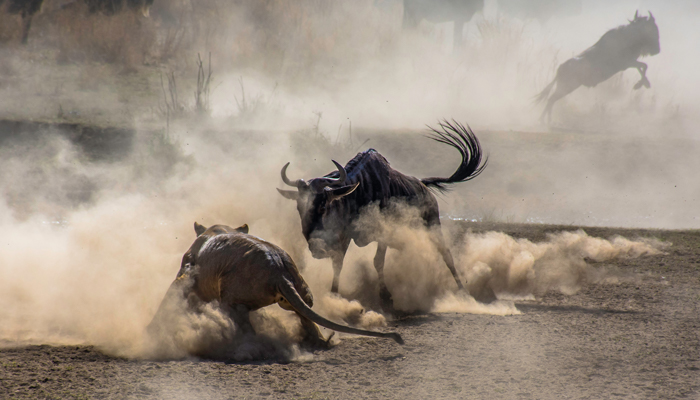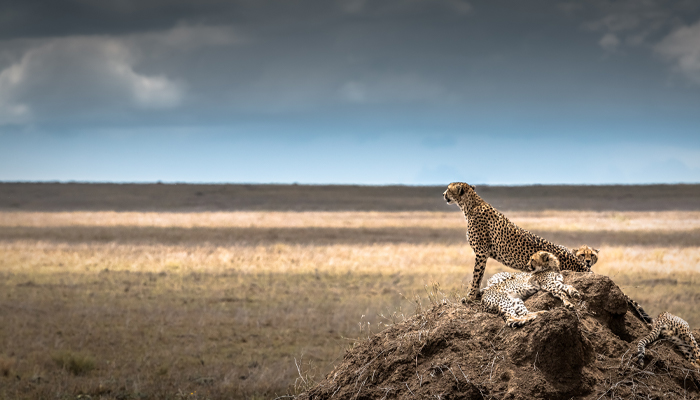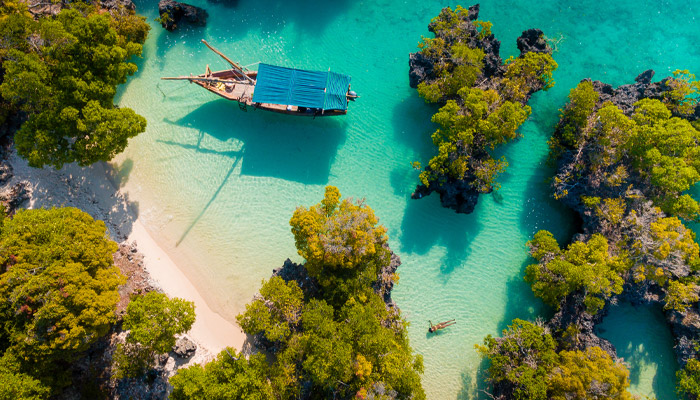Nothing matches the rush of driving through the open plains and sweltering heat of the Serengeti. Eyes peeled. Heart pounding. Hoping for a glimpse of some of the most spectacular creatures that call this planet home. This is no trip to the zoo. Seeing lions on the prowl, giraffes grazing on high tree tops or elephants leading their calves on the long journey in search of water gives you a deep sense of being part of nature’s most incredible natural phenomena.
The Serengeti
As soon as you set foot on the dry soil of Africa’s most famous National Park you become instantly swept up in an overpowering sense of raw anticipation that resonates amongst your fellow safari goers. Then, senses alert and camera prepped, you set off into the wild unknown and it’s everything that you imagined and more. Herds of zebra and wildebeest paint a quintessentially African scene as they wander across the horizon in search of lands anew. Prowling big cats that can only be spotted by the keenest of eyes ignite a sense of simultaneous excitement and danger as they crouch in the grass or laze on low hanging branches. You will encounter species that you had never heard of and experience the passionate rush of coming face to face with nature, which will render the spectacular cinematography of any nature documentary obsolete.

A safari in the wilds of the Serengeti is a sensation for each and every one of your senses. The blistering African heat that ripples the horizon combines with the grunt of a wildebeest, the flicker of a tail in the grass or the symbolic green visage of flat topped acacia trees to constantly remind you that you are a long way from home in the most fantastic way possible. Even at night time there is no escaping the excitement of your situation. After the sun has set, the trumpets, howls and squeals of Tanzania’s abundant wildlife echo across the savanna in a feral chorus. The sounds feed imaginary images of nature at its most spectacular as you attempt to drift off despite the bubbling anticipation of what tomorrow might entail.

The Serengeti manages to retain its enticing splendour no matter how long you stay within its long reaching boundaries. The golden plains, emerald trees and imposing natural rock sculptures of the savanna setting ensure that you are constantly immersed in the moment. The archetypal African setting keeps you alert to all that prowl, march or slither through its magical scenery.
Zanzibar
Whilst it is undeniably exhilarating to delve into the deep wilds of east Africa in search of pure adventure, there is no denying that the constant thrill can prove taxing on your energy levels. That is precisely why a trip to the Serengeti combines perfectly with a trip to Zanzibar.

Shifting from the dizzying thrill of chasing a sight of Africa’s greatest creatures to the paradisiacal combination of turquoise blue waters and pearl white sands on the shores of Zanzibar Island is what sets Tanzania apart from its fellow safari locations. The ideally contrasted elements of these two locations balance out your trip to absolute perfection. Wilderness and paradise. Adventure and tranquillity. Considering the undisputable levels of wondrous beauty that Zanzibar Island possesses, it has remained a relatively undiscovered African nirvana. The impossibly soft white sands are bordered by the vibrant green of a Tanzanian tree line. The sapphire sea is home to traditional wooden boats that bob graciously in their moorings as the tide gradually moves back and forth. Zanzibar is a heavenly island that still retains a delightful charm befitting of the continent in which it sits.
The perfect holiday?
What better way is there to reflect over your time venturing through Africa’s untamed plains than relaxing on what is one of the planet’s most beautiful beach settings as the sun sets over the Indian Ocean? It is simply perfect.
If the wild plains and heavenly beaches of Tanzania are calling to you have a look at our Serengeti to Zanzibar Tour.
Spread the love



